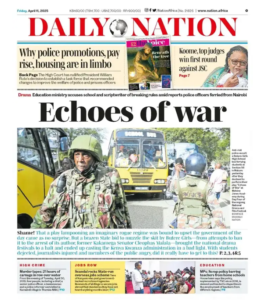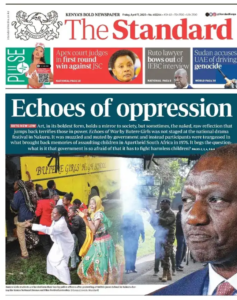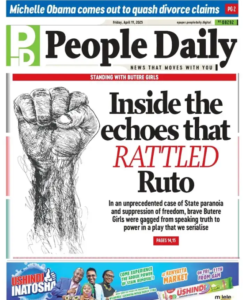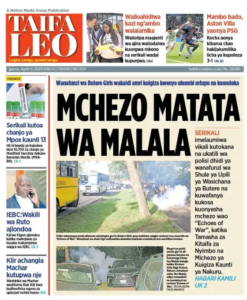A play by Butere Girls High School titled Echoes of War has stirred national debate after it was canceled by the government, leading to the arrest of playwright Cleophas Malala and the suspension of the Kenya National Drama Festivals.
The skit, which humorously depicted a fictional rogue regime, was deemed too political, prompting a heavy-handed response from authorities. There were even reports of police being deployed from Nairobi to enforce the cancellation.
The Education Ministry claims that the school violated festival rules, but the backlash has been swift and intense. Students were left demoralized, journalists covering the event were injured, and the public is enraged by the incident. The heavy-handed approach has led to accusations against the Kenya Kwanza government of censorship and an intolerance for dissent.
Daily Nation: Echoes of War.
Echoes of War has quickly become a national symbol of what many see as a suppression of free speech. The play, meant to be a lighthearted and creative portrayal of a rogue regime, was met with force rather than applause, as government officials were quick to shut it down.
Standard: Echoes of Oppression
 The Standard newspaper captured the chilling irony of the situation. Their headline, Echoes of Oppression, highlighted the power of student art to rattle a regime that sought to silence it.
The Standard newspaper captured the chilling irony of the situation. Their headline, Echoes of Oppression, highlighted the power of student art to rattle a regime that sought to silence it.
The publication described the play as a daring act of creativity by Butere Girls High School, which was barred from the national stage in Nakuru.
In a stark contrast to the celebration and applause the students should have received, tear gas met them instead reminiscent of the apartheid South Africa protests in 1976, where force was used against students demanding their rights.
The government’s overreaction has prompted many to ask: What truth is the government so afraid of that it would use such force against children?
The heavy response has only raised further questions about the nature of the government’s tolerance for dissent.
People Daily: Inside The Echoes That Rattle Ruto.
People Daily reports that the much-anticipated Echoes of War play by Butere Girls High School was met with a dawn police deployment at Melvins Hall, Nakuru, which halted public access to the venue and fueled rising tensions.
The students, instead of performing, chose to sing the National Anthem, pray, and declare a boycott, citing the unfriendly conditions they faced.
Their refusal to perform under such intimidation speaks volumes and turned what was meant to be a showcase of talent into a quiet act of protest against state repression.
Their actions highlighted a profound moment of defiance, showing that the government’s attempt to silence student voices was met with unity and strength.
In the face of threats, the students chose to stand by their principles rather than submit to intimidation.
Taifa Leo
Taifa Leo also covered the incident, reporting on the cancellation and the intense government response. The play was seen as a bold act of artistic expression, but it has now become a symbol of the growing tension between the public and those in power.
The swift action taken by the authorities has left many questioning the government’s commitment to freedom of expression, particularly in an educational setting where young people are supposed to learn and develop without fear of retribution.
The backlash to Echoes of War shows that the current government may be more interested in stifling dissent than allowing space for free thought and creative expression.
The national outrage following the cancellation of Echoes of War has highlighted the increasingly narrow space for free expression in Kenya. The swift response from the authorities has led to growing accusations of censorship, and the government now faces a public outcry over its handling of the situation.
What was meant to be a simple school play has turned into a powerful symbol of the broader struggle for artistic freedom and the right to express dissent.



